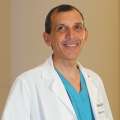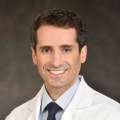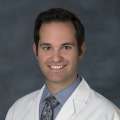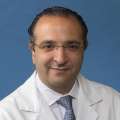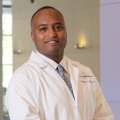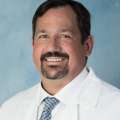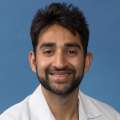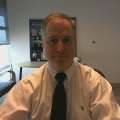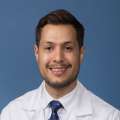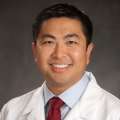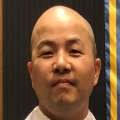Neurosurgery
Our top-rated neurosurgeons use advanced techniques to offer comprehensive neurosurgical care.

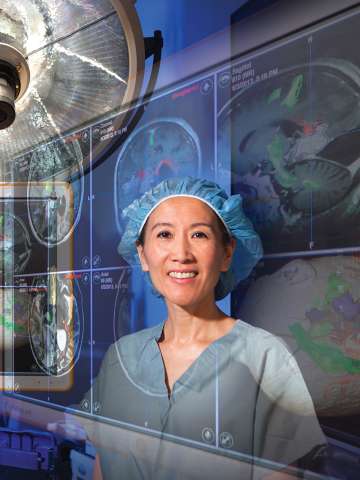
Why Choose UCLA Health for Neurosurgery?
The specialists in the UCLA Health Department of Neurosurgery provide comprehensive, advanced care for patients with complex brain, spine, and nervous system conditions.
We are consistently ranked among the best neurosurgery programs in the nation by U.S. News & World Report.
Highlights of our neurosurgery offerings include:
Nationally recognized clinicians: Our neurosurgeons are leaders in their chosen field. Several of our program’s clinicians consistently rank among the “Best Doctors in America” by the American Health Council. Many of our researchers and scientists are recognized leaders in clinical neuroscience and neurobiology.
Comprehensive subspecialty care: We collaborate closely with subspecialists in neurology, critical care and other areas. This team approach allows us to offer targeted, comprehensive care.
Holistic support: If you or your child needs brain surgery, we aim to make your experience as smooth and stress-free as possible. We offer a Peer Support Program where we connect you with a former patient or family member who has had a similar treatment journey.
Advanced services: We use the most advanced neuroimaging options available. Our neurosurgical intensive care unit (ICU) is equipped with advanced brain monitoring technology. We offer specialized neuroendovascular suites that allow us to provide advanced treatments.
Leaders in neurosurgery research: Our neurosurgeons are leaders in clinical research. For example, UCLA Health neurosurgeons and head and neck surgeons pioneered a new minimally invasive approach for removing tumors. The approach offers better visualization and freedom of movement to remove pituitary tumors confidently and precisely. It also means we have better chances of removing the entire tumor.
Convenient locations and options: Some of our neurologists rotate through outpatient locations outside of Westwood and Santa Monica. This ensures you can receive world-class care close to home. We also conveniently offer telemedicine (video visit) consultations and remote second opinion appointments.
Our Neurosurgery Services in Los Angeles
At UCLA Health, our neurosurgeons collaborate with many subspecialists to offer targeted care. Our areas of care include:
Neurosurgery Programs
Neurosurgeons offer their services in multiple centers and programs, including:
- Brain Tumor Center: We are one of the leading centers in the world for brain tumor diagnosis, treatment and research. Each year, we care for more than 800 patients with brain tumors.
- Cerebrovascular Program: Many cerebrovascular conditions that affect blood flow in the brain are rare. We treat the highest number of patients with these complex conditions in the Western United States. We also partner with industry experts to develop and test the latest tools for cerebrovascular care.
- Epilepsy and Functional Neurosurgery Program: For more than 30 years, we have been leaders in adult and pediatric epilepsy treatment. Between 70% and 80% of our patients experience no further seizures after surgical treatment.
- Pediatric Neurosurgery: We use advanced, research-driven treatments for children. Our neurosurgeons treat a range of pediatric neurologic disorders, including scoliosis, hydrocephalus, craniosynostosis and more.
- Peripheral Nerve Program: Our neurosurgeons care for patients with the most complex peripheral nerve conditions, including brachial plexus and peripheral nerve injuries.
- Pituitary and Skull Base Tumor Program: We have one of the most experienced pituitary tumor treatment teams in the country. Our neurosurgeons collaborate with endocrinologists, neuropathologists and other specialists to provide coordinated care in one convenient setting.
- Spine Center: We use state-of-the-art techniques to treat Chiari malformations and fluid-filled cysts in the spinal cord, called syringomyelia, as well as a range of spinal disorders. Neurosurgeons collaborate closely with orthopaedic specialists to provide all types of spine surgeries.
Neurosurgical critical care
We work closely with the critical care team to treat patients who need emergency neurosurgery. Critical care programs include:
- Brain Injury Program: A full team of specialists cares for patients in the neurological ICU. We provide critical care for all types of brain injuries, including stroke and spinal cord injuries.
- Edie Baskin Bronson and Richard Skip Bronson CBF Laboratory: This cerebral blood flow (CBF) laboratory uses the latest tools to diagnose conditions that affect blood flow in the brain. The equipment in this lab is portable, so we can use it in the neurological ICU to offer expert care.
- Neurocritical Care Program: Neurocritical care is a unique specialty for patients with critical neurological conditions. Our neurocritical care specialists use the most advanced technology to diagnose and treat critically ill patients.
- UCLA Steve Tisch BrainSPORT Program: This specialty clinic researches, treats and raises awareness about traumatic brain injury (TBI). We evaluate and treat any patient who has experienced a concussion, regardless of whether the concussion relates to a sports injury.
Brain and Spine Conditions We Treat
At UCLA Health, our expert neurosurgeons in Los Angeles specialize in providing some of the most common neurosurgeon treatments, including:
- Brain tumors: Growths that occur in or near the brain.
- Chiari malformations: When brain tissue presses through the base of the skull and extends into the spinal canal.
- Epilepsy: A disorder that causes recurring seizures.
- Hemifacial spasm: A neuromuscular disorder that causes involuntary twitches in one side of the face.
- Pituitary tumors and skull base tumors: Tumors that grow near the base of the skull, possibly in the pituitary gland or near the optic nerve — the part of the eye that helps you see.
- Stroke: An emergency interruption of blood flow in the brain.
- TBI: A sudden injury that disrupts brain function.
Neurosurgery Treatments We Offer
At UCLA Health, our expert neurosurgeons in Los Angeles perform a range of surgeries, including:
- Brain bleed stoppage: Emergency surgery to stop bleeding and relieve pressure in the brain.
- Brain tumor resection: Removing as much of a brain tumor as possible while keeping healthy tissue intact.
- Carotid endarterectomy: Removing plaque from arteries to reduce the risk of stroke.
- Craniotomy: Temporarily removing a portion of the skull to operate on the brain.
- Stereotactic radiosurgery: Using focused beams of radiation to shrink tumors or other growths.
- Vagus nerve stimulation: Implanting a device that sends pulses of energy to the vagus nerve, stopping seizure activity.
- Ventriculoperitoneal shunt (VP shunt): Treatment to relieve pressure caused by fluid buildup in the brain.
Our Expert Team
Our neurosurgeons are leaders in research, education and clinical care. We collaborate closely with multiple subspecialists to provide comprehensive neurosurgical services.
Chair
Physicians
Advanced Practice Providers

Find Your Care
Our expert neurosurgery team is committed to providing the finest and most comprehensive patient care. For help finding a neurosurgeon, call 310-825-5111.
Department Links
Helpful Links
Related Clinical Trials
Contact us
Call 310-825-5111 to request an appointment with a neurosurgeon at UCLA Health.




